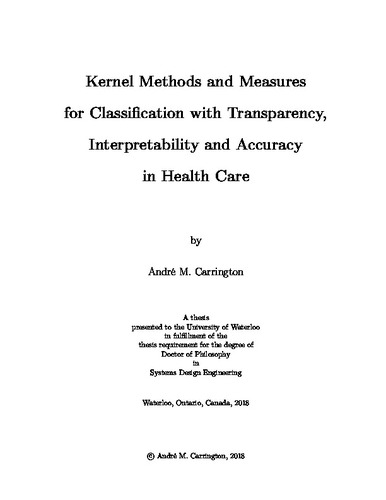UWSpace will be migrating to a new version of its software from July 29th to August 1st. UWSpace will be offline for all UW community members during this time.
Kernel Methods and Measures for Classification with Transparency, Interpretability and Accuracy in Health Care
| dc.contributor.author | Carrington, André | |
| dc.date.accessioned | 2018-09-05 13:02:08 (GMT) | |
| dc.date.available | 2018-09-05 13:02:08 (GMT) | |
| dc.date.issued | 2018-09-05 | |
| dc.date.submitted | 2018-08-27 | |
| dc.identifier.uri | http://hdl.handle.net/10012/13735 | |
| dc.description.abstract | Support vector machines are a popular method in machine learning. They learn from data about a subject, for example, lung tumors in a set of patients, to classify new data, such as, a new patient’s tumor. The new tumor is classified as either cancerous or benign, depending on how similar it is to the tumors of other patients in those two classes—where similarity is judged by a kernel. The adoption and use of support vector machines in health care, however, is inhibited by a perceived and actual lack of rationale, understanding and transparency for how they work and how to interpret information and results from them. For example, a user must select the kernel, or similarity function, to be used, and there are many kernels to choose from but little to no useful guidance on choosing one. The primary goal of this thesis is to create accurate, transparent and interpretable kernels with rationale to select them for classification in health care using SVM—and to do so within a theoretical framework that advances rationale, understanding and transparency for kernel/model selection with atomic data types. The kernels and framework necessarily co-exist. The secondary goal of this thesis is to quantitatively measure model interpretability for kernel/model selection and identify the types of interpretable information which are available from different models for interpretation. Testing my framework and transparent kernels with empirical data I achieve classification accuracy that is better than or equivalent to the Gaussian RBF kernels. I also validate some of the model interpretability measures I propose. | en |
| dc.language.iso | en | en |
| dc.publisher | University of Waterloo | en |
| dc.subject | support vector machines | en |
| dc.subject | kernels | en |
| dc.subject | kernel methods | en |
| dc.subject | model interpretability | en |
| dc.subject | health care | en |
| dc.subject | transparency | en |
| dc.subject | machine learning | en |
| dc.subject | medicine | en |
| dc.title | Kernel Methods and Measures for Classification with Transparency, Interpretability and Accuracy in Health Care | en |
| dc.type | Doctoral Thesis | en |
| dc.pending | false | |
| uws-etd.degree.department | Systems Design Engineering | en |
| uws-etd.degree.discipline | System Design Engineering | en |
| uws-etd.degree.grantor | University of Waterloo | en |
| uws-etd.degree | Doctor of Philosophy | en |
| uws.contributor.advisor | Fieguth, Paul | |
| uws.contributor.advisor | Chen, Helen | |
| uws.contributor.affiliation1 | Faculty of Engineering | en |
| uws.published.city | Waterloo | en |
| uws.published.country | Canada | en |
| uws.published.province | Ontario | en |
| uws.typeOfResource | Text | en |
| uws.peerReviewStatus | Unreviewed | en |
| uws.scholarLevel | Graduate | en |

